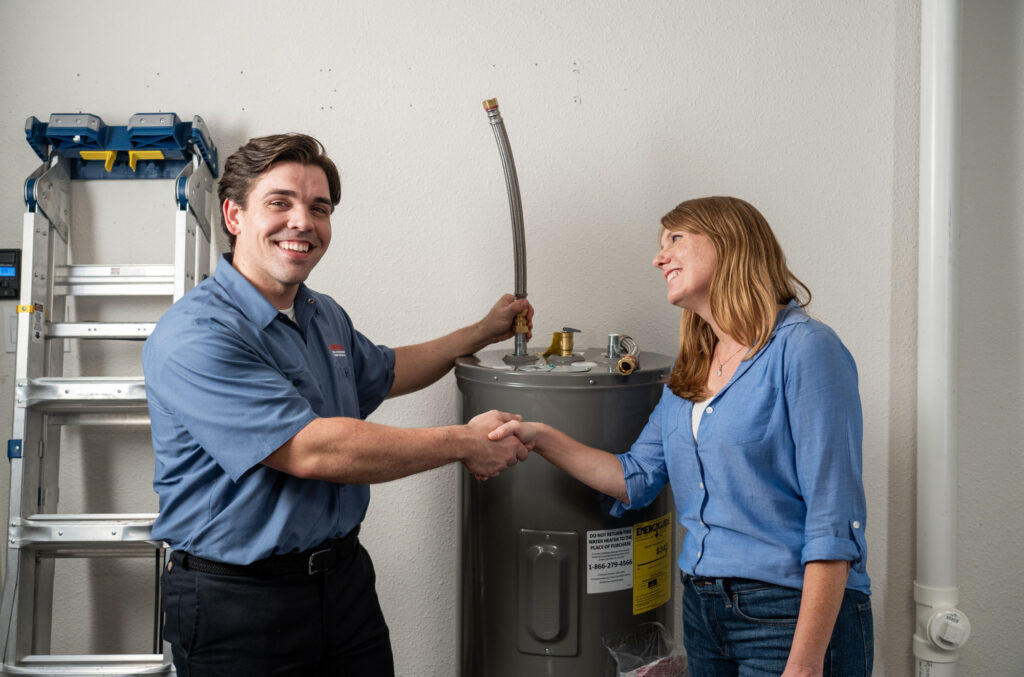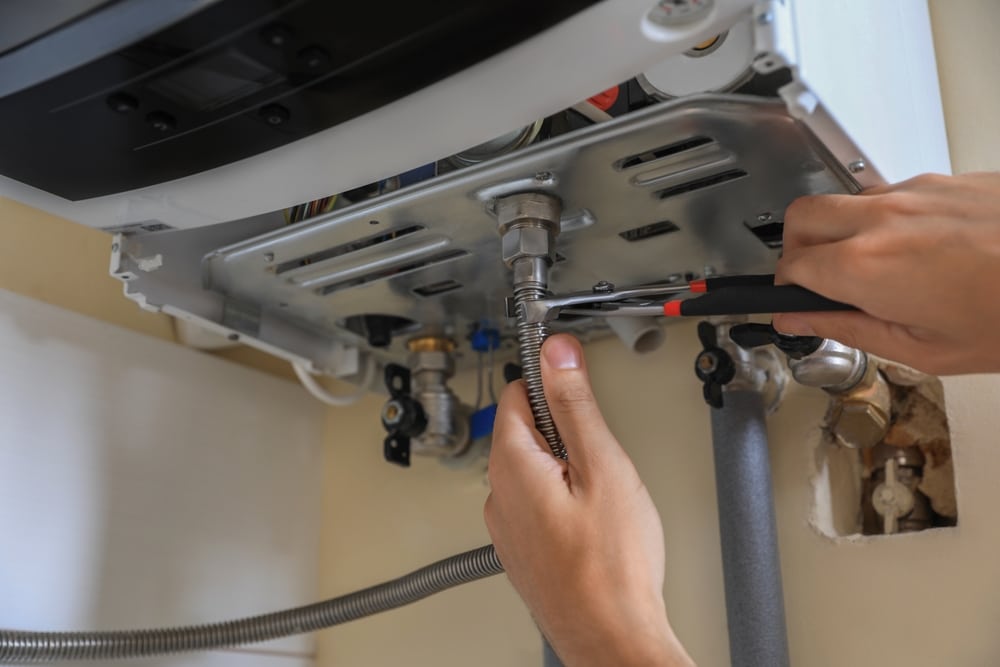Blog
Pros and Cons of Opting for a Tankless Water Heater

As tankless water heaters become increasingly popular, we’ve found that many of our customers are asking us: “Are tankless water heaters worth it?” To answer this common question, the Suntech experts put together a comprehensive guide to tankless water heater pros and cons.
By the time you finish reading this guide, you will know:
- What a tank and a tankless water heater are
- The key differences between tank and tankless water heaters
- The benefits and drawbacks of tank vs tankless water heaters
- Factors to consider when choosing a water heater
What Is a Tank Water Heater?
A tank water heater is a popular method for providing hot water in homes. It is a large, insulated tank that stores and heats 20-80 gallons of water, keeping it warm and ready for use. The tank is filled with cold water, and gas burners or electric heating elements are used to warm it. Tank water heaters are affordable and can quickly provide hot water for multiple uses simultaneously.
What Is a Tankless Water Heater?
Tankless water heaters can heat water instantly, without the need for a storage tank. This supplies hot water as needed. They're compact, energy-efficient, and can help lower utility bills. Additionally, they typically last 15 to 20 years, making them a convenient and eco-friendly investment.
Key Differences Between Tank and Tankless Water Heaters
Energy Efficiency
Tankless units provide substantial energy savings by heating water on demand. This results in lower utility bills that can offset the higher upfront cost.
Space and Installation Requirements
Tankless heaters save space with their compact, wall-mounted design since they don’t require a large storage tank. However, they may need upgraded electrical systems or gas lines, as well as more complex venting, for proper installation.
Lifespan and Durability
Tankless units last up to 20 years compared to tank heaters' 6-10 year lifespan. They experience less wear and require less maintenance because there is no tank to maintain. Tank heaters need periodic flushing to remove sediment buildup and have more components that can fail.
Factors to Consider When Choosing a Water Heater
1. Household Size and Hot Water Demand
Larger households typically require more hot water, especially during peak usage periods, such as mornings and evenings.
2. Water Usage Patterns
Understanding when your house needs the most hot water is an important factor in your decision. Tankless water heaters are ideal for homes with varying usage patterns, as hot water is available whenever needed. Tank heaters, however, are better suited for consistent schedules.
3. Regional Climate Considerations
In colder climates, tank water heaters may be more efficient, as they store and maintain water in their tank, making it easier to heat the water quickly. Tankless heaters may need higher capacities to compensate for colder incoming water temperatures, and it may take a bit longer for the water to heat up.
Comparing Costs
Initial Costs and Installation Expenses
- Tank Water Heaters: Usually range from $300 to $2,000, with installation costs between $500 and $1,000.
- Tankless Water Heaters: Generally cost between $1,000 and $3,000, with installation ranging from $500 to $1,500.
Long-Term Operational Costs
- Tank Water Heaters: Annual energy costs range from $300 to $600, with a lifespan of 8 to 12 years.
- Tankless Water Heaters: Annual energy costs range from $150 to $300, with a lifespan of 20 to 25 years.
Pros and Cons of Each Type
Benefits of Tank Water Heaters
- Reliability: Proven technology with consistent performance.
- Upfront Cost: The initial investment is generally lower than that of a tankless water heater.
- Familiarity with Installation: Standard installation procedures are widely available.
Drawbacks of Tank Water Heaters
- Energy Loss: Heat loss from stored water leads to higher energy consumption.
- Space Consumption: Needs a significant amount of floor space for installation.
Benefits of Tankless Water Heaters
- Energy Efficiency: Reduces energy usage by heating water on demand.
- Endless Hot Water: Provides continuous hot water without running out.
- Compact Size: Features a space-saving design ideal for smaller areas.
Drawbacks of Tankless Water Heaters
- Higher Initial Cost: Significantly more expensive upfront.
- Installation Complexity: May need upgrades to existing plumbing or electrical systems.
- Flow Rate Limitations: Simultaneous high-demand usage can affect performance.
Fuel Type Options
Gas vs. Electric Water Heaters
- Gas: Lower operating cost, faster heating, and works during outages, but needs ventilation and more maintenance.
- Electric: Easier to install, low maintenance, and more efficient, but may cost more to run depending on electricity rates.
Pros and Cons of Condensing Models
- Pros: Very energy-efficient (up to 99%) and great for high-demand homes.
- Cons: Higher upfront cost, complex installation, and more maintenance.
Pros and Cons of Non-Condensing Models
- Pros: Lower cost and simple installation.
- Cons: Less efficient (~80%), higher long-term energy use,but hotter exhaust needs special venting.
Maintenance and Longevity
Regular Maintenance Needs
- Tankless Water Heaters: Flush the system once a year to remove mineral buildup, especially in areas with hard water. Clean or replace filters every 6 to 12 months and inspect the venting system for blockages.
- Tank Water Heaters: Drain the tank annually to clear out sediment. Check the anode rod every 3 to 5 years to prevent rust, and test the temperature and pressure valve several times a year for safety.
Enhancing Lifespan and Efficiency
- Tankless Water Heaters: Consider using a water softener for hard water and set the temperature to between 120°F and 130°F to conserve energy. Schedule annual professional inspections to catch issues early.
- Tank Water Heaters: Insulate the tank and pipes to reduce heat loss, and set the temperature to 120°F. Using a timer can help save energy during off-peak hours.
Environmental Impact
Tankless Water Heaters
- Energy Efficiency: Tankless water heaters heat water on demand, eliminating standby heat loss associated with traditional tank systems. This on-demand heating can result in energy savings of 24% to 34%, as reported by the U.S. Department of Energy.
- Greenhouse Gas Emissions: Electric tankless heaters produce no direct emissions, while gas-powered models emit fewer greenhouse gases compared to traditional tank heaters due to their higher efficiency. However, gas models can emit small amounts of methane during operation, which is a potent greenhouse gas.
- Resource Consumption: Tankless systems are more compact and require fewer materials to manufacture, reducing resource consumption and waste.
Tank Water Heaters
- Energy Efficiency: Tank water heaters continuously heat and store water, leading to standby heat loss and higher energy consumption. They are generally less energy-efficient compared to tankless systems.
- Greenhouse Gas Emissions: The emissions depend on the energy source used. Electric tank heaters produce indirect emissions based on the electricity generation mix, while gas models emit greenhouse gases during operation.
- Resource Consumption: Tank systems require more materials for manufacturing and installation, leading to higher resource consumption and waste.
Making the Final Decision
When choosing tank vs tankless water heaters, consider your household size, daily water usage, and available budget. Traditional tank heaters are often better for large families with high, simultaneous hot water demands. In contrast, tankless systems are ideal for smaller households or those with variable usage patterns, offering energy efficiency and space-saving benefits.
Although tankless water heaters have higher upfront and installation costs, they typically result in lower long-term energy bills and have a longer lifespan. By factoring in energy efficiency, maintenance needs, and potential rebates, you can estimate your overall savings and determine which system offers the best value for your home.
Frequently Asked Questions
Tankless water heaters have higher upfront costs, more complex installation, a limited flow rate, require maintenance, and are power-dependent. They may also necessitate upgrades and frequent descaling.
Replacing a 40-gallon tank water heater with a tankless model may require upgrades to your existing gas or electrical system and may involve a more complex installation. Consult a professional to assess your home's suitability for a tankless water heater.




